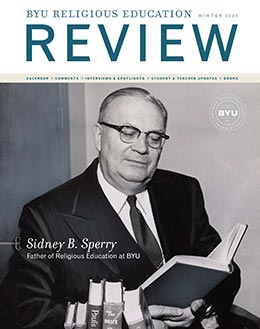Scott C. Esplin (scott_esplin@byu.edu) is an assistant professor of Church history and doctrine at BYU.
Addressing the faculty of Religious Education at Brigham Young University in April 1974, Elder Boyd K. Packer remarked, “We have, I am sure, all read [‘The Charted Course of the Church in Education’]. But some of us have not read it enough. President [J. Reuben] Clark was a prophet, seer, and revelator. There is not the slightest question but that exceptional inspiration attended the preparation of his message. There is a clarity and power in his words, unusual even for him. I know you have read it before, some of you many times, but I assign you to read it again. Read it carefully and ponder it.”[1] This charge to return to “The Charted Course of the Church in Education” was not the talk’s first connection to Religious Education, however. From its initial delivery until today, President Clark’s message has always been linked to Religious Education at BYU.
The talk was originally declared to an assembled body of seminary, institute, and BYU religion faculty members gathered on August 8, 1938, for BYU’s summer school. Under direct assignment from the First Presidency, President Clark delivered an address aimed, in his own words, at “curing the situation which has developed”[2] within Church education. Specifically, as he later observed, the talk addressed concerns that some teachers “could not bring themselves to teach the doctrines of the Church because of what their non-Church member colleagues would say about them.” Among others, he noted that “the Brigham Young University people were almost apologetic about the Gospel.”[3]
The talk forever charted a new course for Religious Education. The BYU Board of Trustees, previously composed of local officials, was replaced by a board that included the First Presidency and members of the Quorum of the Twelve Apostles. Church Commissioner of Education Franklin L. West reviewed the religion curriculum at BYU, changing it from “the study of religion and ethics, with our own religion really as a part of this general study” to the study of the gospel as “the essential thing.”[4] Course requirements in scriptural subjects replaced classes like the psychology and sociology of religion, eliminating a loophole that allowed a student to “go the full four years at BYU and not take a genuine religion course.”[5] Finally, teacher selection was reevaluated, with Commissioner West “insisting that no teacher should be employed in the school who is not spiritually sound.”[6]
Over seven decades since these changes, the guidelines outlined by President Clark in his classic address continue to influence Religious Education at BYU. Teachers are expected to possess a personal testimony of the gospel, coupled with the moral and intellectual courage to proclaim it. “No amount of learning, no amount of study, and no number of scholastic degrees,” declared President Clark, “can take the place of this testimony.”[7] Teachers of religion “are not to teach the philosophies of the world, ancient or modern, pagan or Christian.” Rather, their “sole field is the gospel, and that is boundless in its own sphere.”[8] Doing so causes students and teachers in Religious Education to “stand upon the highest peak in education.”[9]
Notes
[1] Boyd K. Packer, “That All May Be Edified” (Bookcraft: Salt Lake City, 1982), 44.
[2] J. Reuben Clark Jr. to N. L. Nelson, October 27, 1938, correspondence, in Clarkana: Papers of Joshua Reuben Clark Jr., Twentieth and Twenty-first Century Western and Mormon Americana; L. Tom Perry Special Collections, Harold B. Lee Library, Brigham Young University, Provo, UT.
[3] J. Reuben Clark Jr. Diary: 1936–1939, January 23, 1939, 61–63, in J. Reuben Clark Jr. Papers, 1871–1961; L. Tom Perry Special Collections, Harold B. Lee Library, Brigham Young University.
[4] J. Reuben Clark Jr. Diary: 1936–1939, July 21, 1939, 166, in J. Reuben Clark Jr. Papers, 1871–1961; Special Collections, Harold B. Lee Library, BYU.
[5] Russel B. Swensen Oral History, interview, September 13, 1978, 16, Special Collections, Harold B. Lee Library, BYU.
[6] J. Reuben Clark Jr. Diary: 1936–1939, January 23, 1939, 61–63, in J. Reuben Clark Jr. Papers, 1871–1961; Special Collections, Harold B. Lee Library, BYU
[7] J. Reuben Clark Jr., “The Charted Course of the Church in Education,” Improvement Era, September 1938, 571.
[8] Clark, “Charted Course,” 573.
[9] Clark, “Charted Course,” 572.
